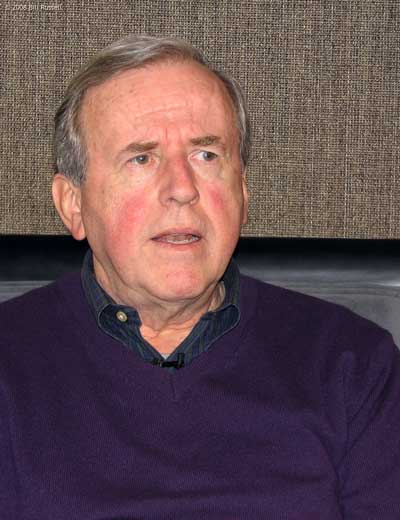 |
Thomas Cahill... historian and writer. Furthering his “hinges of history” series, Thomas Cahill’s Mysteries of the Middle Ages explores what he sees as the early stirrings of the “modern.” His earlier explorations include How the Irish saved Civilization, The Gifts of the Jews, Desire of the Everlasting Hills and Sailing the Wine-Dark Sea. Once prominent in the business of publishing, Mr. Cahill now devotes full time to his writing, dividing his time between Europe and New York City. |
As humanity teeters on the brink of a radically new era yet unnamed, the birth of our “modern” world can be instructive. Thomas Cahill, intrigued by what he calls the “hinges of history” including How the Irish Saved Civilization, takes special delight in the beginnings of the modern era. It stretches through the 12th and 13th centuries, opening the way for Western culture’s Renaissance.
“The one thing that history never does is repeat itself exactly. But history is nonetheless full of lessons for us if we bother to look at them.”
The three great things Mr. Cahill says he was intent on tracking in Mysteries of the Middle Ages and the Beginning of the Modern World are feminism, science and art. Each involved an entirely new way of seeing the world around us.
“Feminism is really born in the Middle Ages. Surprise surprise! But there you are. It never existed before. You have female figures, for the first time, being in charge. The two I point out, but there are many of them, are the secular figure, Eleanor of Aquitaine, and Héloise.
Héloise, who became an Abbess, starred in the 12th century’s great love story, with Abelard, who became an Abbott.
“She is in some ways the person who is closest to us of all of these people. There are many people tending toward the modern in this (era), but she's there, she's completely modern.”
Science?
“In the twelfth and thirteenth centuries, you have Aristotle really coming into his own. For the Greeks, Plato was the great philosopher. He created an enormous division between the world of spirit and of flesh and took a very dim view of most human minds. Plato thought his mind was fine, but most of us were sitting in the cave, in the dark, seeing shadows.
“To which his best pupil, Aristotle, said ‘Oh, nonsense. We can be fooled, yes, but by and large our senses actually tell us what's there. We are not in the shadows of the cave, we are actually in the sunlight.' He also gives us a much more positive view of what the human mind can do unaided by anything but itself. It doesn't need revelation.
“And (Aristotle's ideas are) picked up by people like Francis Bacon, and much more by people like Abelard and Thomas Aquinas. With that, you get the impetus for science -- a spirit that can take up science seriously and say, ‘We're going to look at this and figure it out.’”
Mr. Cahill uses the great painter Giotto to demonstrate how all the arts were set for huge transitions.
“Giotto really is a child of St. Francis, who invented the Christmas créche. St. Francis said (in effect) ‘What would it have been like to have been there?’ This is a completely new question. And it is the beginning of realism, whether in the plastic arts or in theater or finally in literature.”
Dante embodies the latter for Mr. Cahill.
“In many ways Ithink that the Divine Comedy may be the best book ever written, it’s just so wonderful. Dante’s really writing psychologically. He's writing about how people have lived and where they belong as a result of how they've lived.
“I think we should keep in mind that the glories of the Catholic Middle Ages were the work of people like Giotto and Dante, not of the bishops of the Middle Ages, anymore than (today’s bishops) would be.”
Even when we think we have good cause to scorn ideas left behind with the Dark Ages -- like the world is flat -- Mr. Cahill cautions us to be be appropriately humble.
“There are plenty of stupid things that we think. And we will never know how stupid they are. But in the future, it will be exposed.”
[This Program was recorded March 10, 2008, in Atlanta, Georgia, US.]








